Several Dominicans of Haitian descent interviewed by AyiboPost still can’t believe how the past four years have unfolded
There were about 10 of them in a room at the Centro Montalvo on Wednesday, May 15, 2024.
These Reconoci.Do executives, a movement of young Dominicans of Haitian descent, are not holding a political meeting so early in the morning.
Instead, they are organizing a leadership training in Santo Domingo at Calle Josefa Brea.
In the streets of the capital, the atmosphere is one of « Caravañas electorales. »
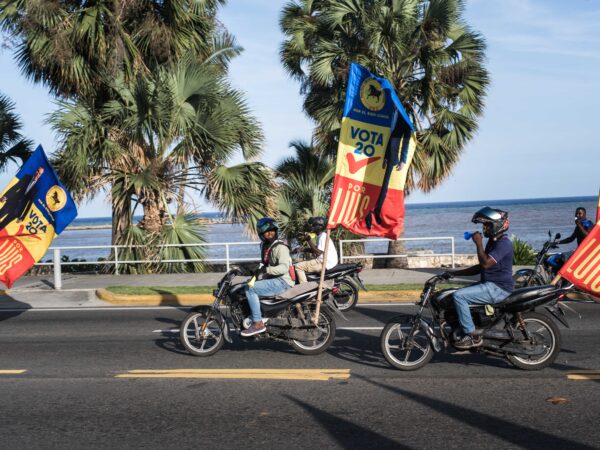
Malecon de Santo Domingo (Sunday, May 13, 2024) Day of electoral caravans in several provinces of the country of the presidential party, the PRM. | © Pierre Michel Jean
Several million Dominican voters will go to the polls to elect or re-elect their political representatives this Sunday, May 19. They must vote for an executive duo (President and Vice-President), 32 senators and 190 deputies.
The polls leave very little room for doubt. They confirm trends already observed in the municipal elections last February: a clear lead for President Luis Abinader’s party, the « Partido Revolutionario Moderno » (PRM).
During his first term in office in 2020, the Dominican head of state — who is seeking re-election — has missed no opportunity to exacerbate tensions between the two countries.
This is evidenced by the construction of a wall on the border, the crisis over the Ouanaminthe canal, the mass deportations of Haitian immigrants in violation of the bilateral treaty of December 1999, the refusal of transit for Haitian travelers, etc.
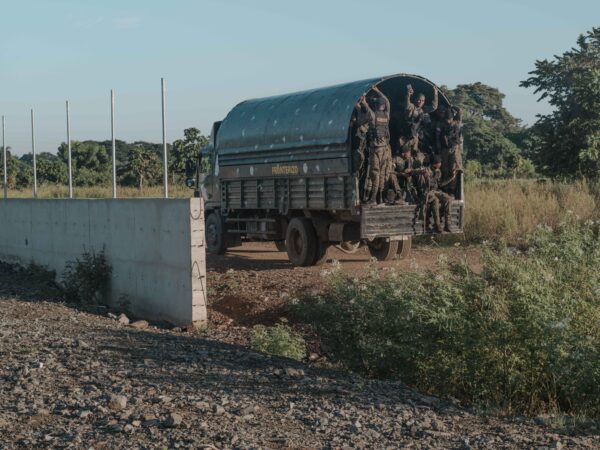
Truck of Dominican soldiers coming to relieve other soldiers at the Dominican-Haitian border at the Pittobert level, a few meters in front of the Haitian canal being built. (September 19, 2023)
The dozen or so Reconoci.Do executives carried on with their work, as if the May 19 exercise meant very little to them.
The political use of anti-Haitian rhetoric during the election campaign is not enough to explain the disenchantment of Dominicans of Haitian descent with their country’s politics.
Recent history is full of uncomfortable and painful events.
Like in 2013 when the Dominican Constitutional Court (the country’s highest judicial court) retroactively denationalized generations of Dominicans of foreign ancestry dating back to 1929 with its « Sentencia 168-13. »
The decision had thus rendered hundreds of thousands of individuals stateless, mostly Dominicans born to Haitian parents.
It took several months of advocacy by NGOs and strong pressure from the international community for the then president of the Dominican Republic, Danilo Medina of the PLD (Partido de la Liberación Dominicana), to finally decide to take action.
A law — 169-14 — was therefore adopted to reinstate more than 200,000 Dominican nationals discriminated against by the jurisprudence of the Constitutional Court.
Nine years after the end of the National Plan for the Regularization of Foreigners (PNRE), which was supposed to allow them to regain their nationality, the problems of papers persist for many and the trauma remains.
Several Dominicans of Haitian descent who met with AyiboPost still can’t believe how the last four years have unfolded.
Recent history is full of uncomfortable and painful sequences.
In addition to voting for the PRM, many of them personally lobbied with friends and family to get Luis Abinader elected in 2020.
Isidro Berique, a Reconoci.Do executive and now deputy coordinator of the province of San Pedro de Macorís for the same movement, remembers going door-to-door in his neighborhood to promote the PRM.
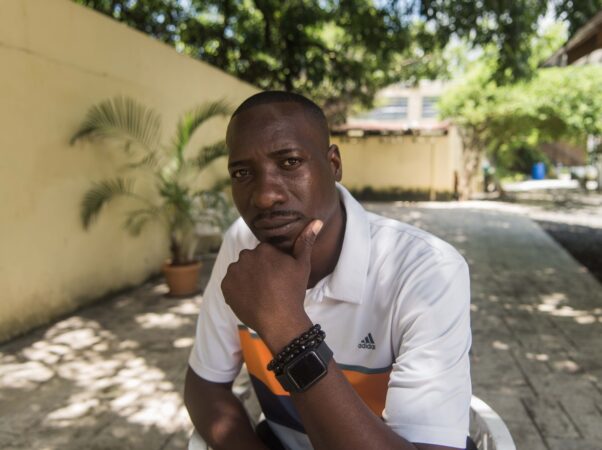
Isidro Berique was born to Haitian parents in the province of San Pedro de Macoris. He began to campaign to have his papers in order and to attend university. Later, he joined other people in the same situation to create Réconoci.Do. In 2020, Isidro was particularly confident that the PRM’s tenure would be different and that Luis Abinader would correct the anomalies left by the LDP.
« We had been fighting since 2010 for our civil rights against a Dominican administration and government, first led by Leonel Fernández and then by Danilo Medina of the LDP. I thought it would be different with the PRM, that our situation would evolve in the right direction, » explains the young man with a hint of bitterness in his voice.
Other Dominicans of Haitian descent, such as Eduardo Francisco of La Romana province, voted for the PRM out of conviction.
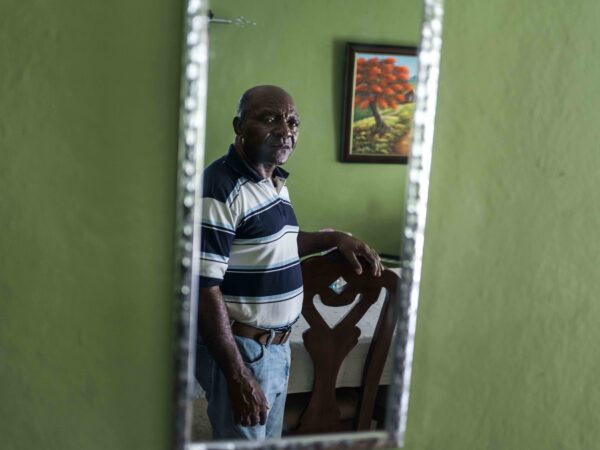
Eduardo Francisco was born and raised in a batey in Seibo, Dominican Republic. Both of his parents are from the Southeast Region of Haiti. Eduardo’s work as an activist and socialist activist led him to visit Haiti several times. He worked for a long time with the Dominican-Haitian Cultural Center (CCDH), one of the first structures created by Dominicans of Haitian descent in neighboring land.
At 67 years old and with a long history in Dominican socialist movements and parties, the candidate Luis Abinader seemed to him to be close to his ideals.
« I went to one of his rallies that was held in my city during the PRM primary. I was very interested in his position on human rights and, in addition, he claimed to be in line with the ideals of Peña Gomez (former black mayor of Santo Domingo). I convinced several people to vote for him, » adds Francisco, who clearly regrets having been overzealous.
Today, Francisco denounces the situation of near-civilian death in which some of his fellow Dominicans of Haitian descent find themselves.
Dominicans of Haitian descent are paying the price for the crises between the two countries.
Read also: Perspective | The roots of tensions between Haiti and the Dominican Republic
Lawyer and professor, Felipe Fortinez, born to Haitian parents, is from a batey in Monte Plata.
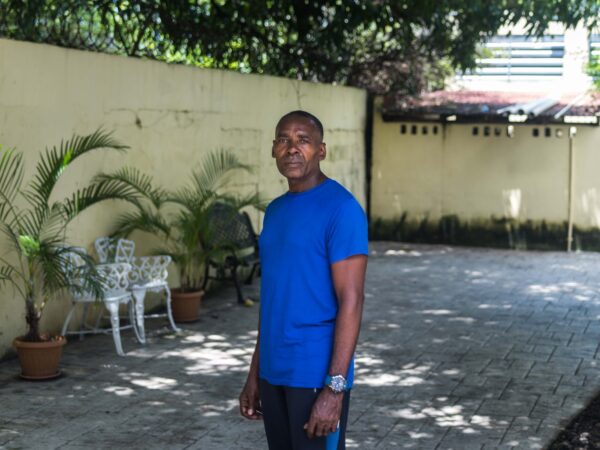
Felipe Fortinez is a lawyer and also one of the founding members of Reconoci.Do. His parents gave birth to him in a batey in La Agua in the province of Monte Plata. Felipe’s mother was already Dominican of Haitian descent. Today, Felipe feels that he is in a different register than other Dominicans who have no connection with Haiti. « The fear is perpetual, I have the impression that even in 30 years it is possible that the administration could tell me that my Dominican nationality was not proven. »
« Sometimes I feel like these situations are worse for us Dominicans, compared to the Haitians who live here, » Fortinez says.
« Haitian nationals will still be able to return home if there is a need. But our home is here. So when there are hate campaigns against black people, against Haitians, we are in the middle and we suffer everything, » Fortinez continues.
The resentment is indeed reflected in the public debate. « As soon as they have a relationship with Haiti, even ordinary subjects take on extraordinary proportions, » Fortinez observes.
« The Haitian theme is really one of the adjustment variables for policies here, » says Felipe, who is an activist with Reconoci.Do.
During the canal crisis, nationalist influencers and other extremist groups went on a rampage through social media.
Read also: « Kanal la Pap Kanpe », one of the most important popular solidarity movements in Haiti
« Dominicans of Haitian descent are lumped together with undocumented Haitian immigrants and this group, once designated, is treated with all manner of insults. Personalities like Yavira Marte, an anti-Haitian influencer on social media, have become more and more active under Luis Abinader’s presidency, » Eduardo Francisco reveals, listing one by one the names of the nationalists and the insulting remarks they make.

Anti-Haitian comment on Facebook: « If this guy is Dominican, I’m Russian. »
There seems to be a consensus on how to treat Haiti among the 3 political parties leading in the polls and voting intentions in the Dominican Republic (PRM, LDP and FP).
A radical shift has been observed in the Dominican Republic’s policy towards Haiti since the death of President Jovenel Moïse in July 2021, according to observers.
« Almost unanimously, the political class thought that it had to take drastic measures with regard to Haiti, » says Edwin Paraison, Executive Director of the Zile Foundation and a long-time observer of Dominican politics.
As a result, Paraison continues, « the issue of Haitian migration has once again come to the forefront, and this has been followed by the emergence of pressure groups in the neighborhoods to dislodge Haitian immigrants, mass deportations, etc. All this in a kind of laxity and omerta by the authorities and politicians. »
At least 28 political parties signed a pact proposed by the presidency for a political consensus around the crisis in Haiti in October 2023: the « Pacto de Nacion por la crisis Haitiana. » This took place in a context that further weakens the situation of immigrants and undocumented Haitian workers, where they are regularly victims of abuses, irregular deportations and abuses by the authorities of the Dominican Republic.
« The reports of denunciations or reports of these serious human rights violations by the Dominican authorities, made by organizations such as Amnesty International, are contested in chorus by the Dominican class, » regrets the former Haitian ambassador to the Dominican Republic, Edwin Paraison. « And this, even if the facts are proven and documented, the highest figures of political life follow one another in the media to dispute the reports. »
Read also:Luis Abinader’s deportations hinder Dominican image and economy
Dominicans of Haitian descent, however, do not represent a monolithic political bloc. Their vote, according to Edwin Paraison, is « very dispersed. »
« In the communities of Dominicans of Haitian descent who can exercise this vote, each of the major parties has been able to capture part of their support. This diversification means that the impact of this vote is less important, » explains the former diplomat.
This observation differs greatly from the trend of the 1990s, according to analysts.
« A majority of the Dominicans in this community were linked to the PRD (Partido Revolucionario Dominicana) at the time, » according to Paraison. Probably, the former diplomat analyses, because of its leader Jose Francisco Peña Gomez. The former Mayor of Santo Domingo often spoke of a « Colchón de vote » (reserve of votes). Because he was black, Peña Gomez was often equated with Haiti and Haitians. »
Today, the PRD, the former party of the charismatic Dominican leader who died in 1998, is struggling to recover from the last schism that gave birth to the PRM.
In the February 2024 municipal elections, the party was only credited with 2.87% of the votes cast. These results do not discourage Epifania St-Chals, the daughter of Haitian cañeros, a native of Santa Cruz in the province of Seibo, who has always campaigned for the PRD.
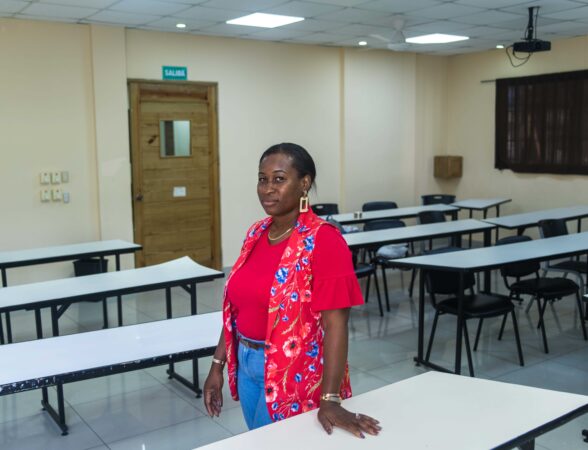
Epifania St-Chals was born in the municipality of Santa Cruz de Seibo. Her father, who arrived in the Dominican Republic in 1959, and her mother in 1962, benefited from workers’ cards from the administration of the factory for which they had worked. These precious documents will justify in the eyes of the Dominican justice that Epifania’s parents were not in transit/illegals at the time they gave birth to her. Although not affected by the « Sentencia 168-13, » Epifania has chosen to campaign with her Dominican compatriots for full recognition of their Dominican nationality.
« I never believed in the PRM, » says St-Chals. « I knew that those who form this party today were at the root of the split with the PRD. For me, Luis Abinader was indeed a conflicted person, » explains this activist who campaigns with Reconoci.Do and with former Haitian braceros workers for their pension.
According to the latter, Abinader « used the issue of undocumented Dominicans during his campaign for purely electoral purposes. He has proven to be the most discriminatory and anti-Haitian president there is. »
As far as the vote of this category of victimized Dominicans is concerned, attorney Felipe Fortinez says that he does not believe that it is essentially driven by identity.
« Dominicans born to Haitian parents, for the most part, are living the election campaign with the same passion as the rest of the country, » according to Fortinez.
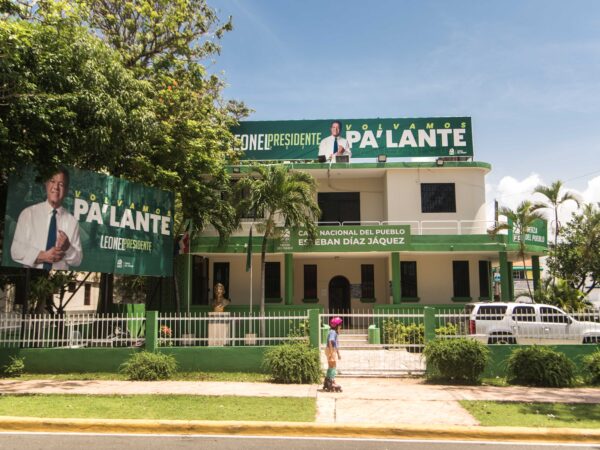
The headquarters of the Fuerza del Pueblo Party led by Leonel Fernandez, former president of the Dominican Republic (1996-2000, 2004-2012). Many Dominicans of Haitian descent blame him for the situation of civil death in which they found themselves 11 years ago.
« On the day of the vote, » continues attorney Fortinez, « many of them will forget the setbacks of the past 4 years. They suffer from the context, but they share much of the same experience as the rest of the Dominican population. They have in common the same way of looking at certain things. »
It remains difficult to claim one’s Haitian ancestry in politics in the Dominican Republic.
« It’s a small country, and in a province like La Romana, Dominicans born in bateyes (workers’ camps) know each other, » says Eduardo Francisco.
« If a Dominican of Haitian descent who is running for re-election claims that identity, you can be sure that the nationalists will come down on him immediately, » Francisco says.
The activist names three Dominican magistrates born to Haitian parents in the Southeast region. A visit to the Facebook pages of elected officials suspected of being Dominicans of Haitian descent shows that their non-claim to this identity does not exempt them from racist and anti-Haitian remarks by nationalists.
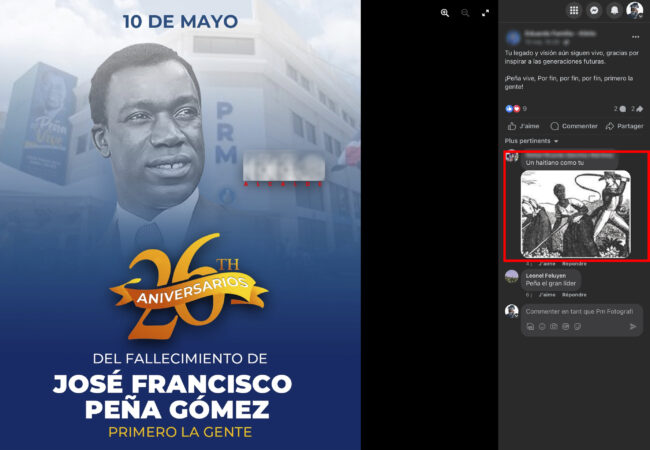
Jose Francisco Pena Gomez
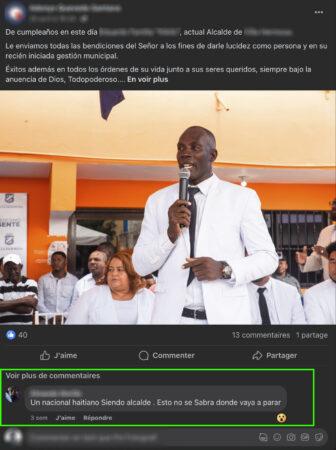
Election campaign in the Dominican Republic of Dominican candidates of Haitian descent.
Is another strategy possible?
Ramòn (Britus) Briti wants to believe so.
As a community leader in the municipality of Villa Hermosa, Briti was born to a Haitian father and a Dominican mother. He hopes, with his political movement (RD+), to unite his compatriots in 2028 on the basis of other motives and themes than that of anti-Haitianism.
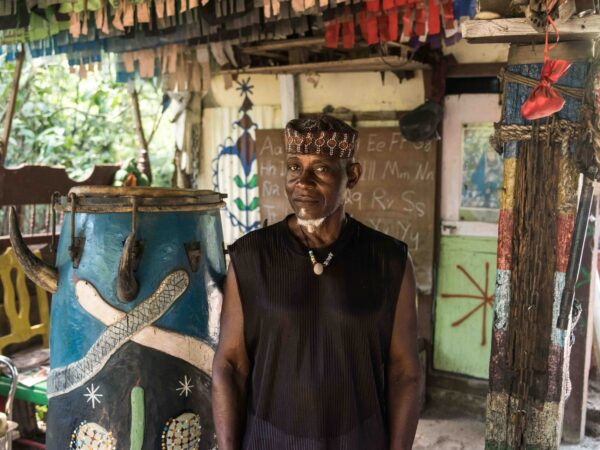
Ramòn Leoliano Briti is a houngan and owner of the Gaga Resignado/Reziye in Villa Hermosa (La Romana). Ramòn believes that Dominicans of Haitian descent need to participate in politics and weigh in to change things on their own.
« The Dominican education system, even before the nationalists, hinders Dominicans of Haitian descent, » Briti observes.
Education does not allow these Dominicans « to accept this identity, so many, in addition to not claiming it or even saying their origin, prefer to live in denial of this identity. That’s what we have to change too, » insists the Houngan leader of the Gaga Resignado/Reziye.
Ramòn assumes his multiple identity. He claims to be a Dominican with Haitian but also African filiation. His peristyle is filled with objects and symbols referring to this triple identity.
The Dominican election campaign and presidential candidates have largely ignored the situation of this category of Dominicans, even though they are facing real difficulties, according to analysts.
Years after the PNRE, thousands of them are still confronted with the Dominican administration, which is slow to grant them effective recognition of their Dominican citizenship.
« After the PNRE, they divided the applicants into two categories: A and B. In the first category, there should be those for whom the paperwork was in order, but even these encounter difficulties. When they have to carry out administrative procedures for themselves or for their children, there is always a chance that it will not work, » explains attorney Felipe Fortinez.
Some of those in category B are still waiting for a response from the Dominican administration. « And the chances for them to obtain papers, such as a passport, for example, are even more difficult, » Fortinez continues.
The electoral campaign and the candidates for the Dominican presidency have largely ignored the situation of this category of Dominicans, even though they are facing real difficulties.
Unlike the 2020 elections where candidate Luis Abinader courted this electorate, for this election, almost no candidate dwells on their fate. They are lumped together with Haitian immigrants and sometimes, like them, end up being victims of the authorities’ repression.
This is Epifania St Chals’ observation: « Nothing has really changed for some Dominicans of Haitian descent in 11 years. The program that followed did not set a deadline for deliberation on the cases of the various applicants. The provisional documents delivered by the administration to some may expire and sometimes, Dominicans of Haitian descent are deported to Haiti with the immigrants. »
Regardless of the difficult context, the few Dominicans of Haitian descent interviewed as part of this work all want to go to the polls on Sunday.
Découvrez l’histoire d’Ana Maria Belique, coordinatrice de Reconoci.do, un mouvement qui milite pour le droit à la citoyenneté et l’égalité pour tous les Dominicains d’origine haïtienne (AyiboPost a publié cette histoire en décembre 2019) :
Cover image: Malecon de Santo Domingo (Sunday, May 13, 2024) Day of the electoral caravan in several provinces of the country of the Presidential Party, the PRM.
The images are by Pierre Michel Jean.
Keep in touch with AyiboPost via:
► Our Telegram channel : click here
► Our WhatsApp channel : click here
► Our CommunityWhatsApp:click here


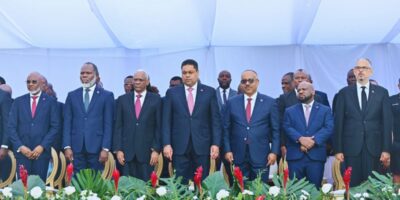
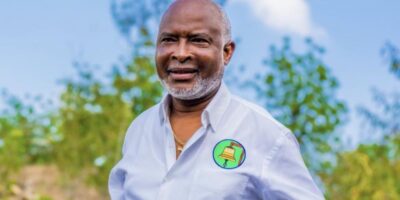



Comments